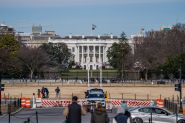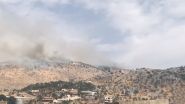
Amid a national outcry about the protracted presence of displaced Syrians, compounded by calls to tighten control on their illegal residence, the rise in criminality in recent weeks involving Syrians is increasing tensions with their Lebanese hosts.
The latest of these crimes occurred on Saturday (May 4) at Universal residence in Beirut, where a 30-year-old Lebanese woman died of a cerebral hemorrhage after receiving a violent blow to the head. The assailant is suspected to be a Syrian colleague who has since disappeared.
A day later, Syrian teenagers stabbed a Lebanese boy, Yorgo Abi Aad, who suffered injuries in the elbow, hand and neck.
Preliminary reports suggest that the assailants, aged 13 and 15, attempted to rob Abi Aad in a basketball court in Furn el Chebbak. Local residents captured two of the attackers and handed them to security forces, while the third managed to escape.
A month earlier, an official in the Lebanese Forces, Pascal Sleiman, was killed by Syrian assailants after stealing his car. Sleiman’s body was taken to Syrian territory where it was dumped. The incident touched off a wave of condemnations and calls for repatriating displaced Syrians, believed to be more than 2 million, most of them residing illegally in Lebanon.
Another crime that further increased hostility against Syrians was committed in Beirut’s neighborhood of Ashrafieh against an elderly man and his wife. The couple was robbed by their Syrian maid and her Syrian accomplices, who killed the man and seriously injured his wife.
A few days later, Yasser al-Koukash, a Lebanese resident of the town of Azzouniyeh in Mount Lebanon’s district of Aley, died following an attack by three Syrian nationals who tied him up and ransacked his apartment.
In a country on the brink of chaos, where security is volatile and evading accountability and punishment is widespread, illegal Syrian presence and the surge in criminality are fueling anger among Lebanese.
Sources at the Ministry of Interior told This is Beirut that the Ministry is closely monitoring the situation and will enforce Lebanese laws, especially regarding displaced Syrians.
Lebanon estimates the number of Syrian migrants on its territory to exceed 2 million people, most of them having fled the war at home since 2011. However, illegal crossings by Syrian migrants persist through the porous borders for economic reasons.
Lebanon's caretaker Interior Minister Bassam Mawlawi told a news conference on the first of May that 30 percent of crimes perpetrated in Lebanon are committed by Syrian nationals, significantly straining state resources.
For his part, journalist Youssef Diab attributed the rise in crimes committed by Syrians to "the absence of the state and its authority." In an interview with This is Beirut, he emphasized the weakening of the Lebanese state as a primary issue, citing a decline in security capabilities to fight crime effectively. Additionally, he pointed to the lack of regulations to deal with the Syrian displacement problem and the presence of numerous illegal Syrians with unclear residency status, employment and housing arrangements.
Diab asserted that the current situation surpasses the capacity of the state to manage it independently. “There should be a cooperation with international organizations and countries concerned with Lebanon,” he said.
He warned that failure to implement a comprehensive solution swiftly could exacerbate existing problems. Diab also observed a decline in the judiciary's efficiency, operating at only 20 to 30% of its capacity due to the ongoing crisis, thereby complicating legal proceedings.
“This necessitates urgent action on the part of the state to restore its authority, regulate foreign presence in Lebanon, and adopt a more robust approach to combating crime,” he added.
Read more




Comments